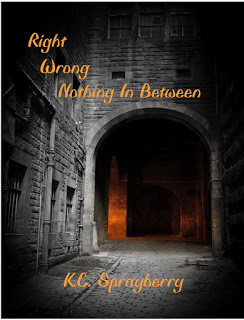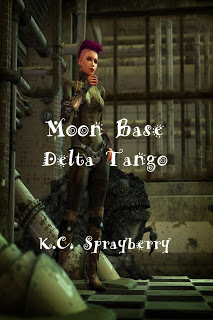K.C. Sprayberry's Blog, page 143
October 18, 2016
Introducing Novels
You’re looking for a way to introduce your novel, or series, or even a couple of quasi-related books, and can’t come up with anything that will work. Have you thought of a collection of short stories designed to introduce your characters or a scene that is pivotal to the book but doesn’t fit in there? You can even combine stories from several books of the same genre, and give your readers a double treat. Let them read these quickies and see if they’re interested in “catching up on the whole story.”
Right Wrong Nothing In Between introduces the Paradox Lost Trilogy and a standalone novel The Curse of Grungy Gulley. The two stories here aren’t available in print, but they are in a wonderful ebook that you can read on your coffee break. Or your lunch hour, if you want to devour both at the same time.
Sometimes the past and the future aren’t so different after all. Consequences catch up with everyone. Even if you’re a prophet who sees salvation. Even if you’re a demon set on destroying the world.

He stood on the banks of the Coosawhatchie River. The man of many years stared across the small waves causing a rowboat at a pier to bob up and down. The boat seemed to represent his life, from the day he arrived, throughout his own education where he felt as if Travelers made up the rules as they went along, and into his own years actively traveling through time.
He had been graced with the name of Dennis James Sullivan. Dennis for his father, the greatest fire chief in San Francisco’s history, and James for his mother’s brother, a banker in the Midwest.
Both had contributed to his youth, but James, as he was called, learned more from the father he’d planned to emulate, until fate in the form of a Gateway changed everything seconds before the Great Earthquake and Fire of 1906.
James believed that he had conquered the turmoil he felt at abandoning his mother. His duty had been to change Traveling, according to the woman who had approached him as he mourned for his father. He was always one to obey duty. His life had certainly been filled with excitement in the early years, but then he gave up his jaunts through history to raise his family and teach future Travelers.
Is this my fault? Did I somehow fail my students?
Get Right Wrong Nothing In Between On Amazon!
Published on October 18, 2016 00:00
October 17, 2016
I Am The Writer
There are five stages that best describe writers. We like to refer to this as our process. One must realize one thing about writers, and it was said best by science-fiction, Robert A. Heinlein.
“There is no way that writers can be tamed and rendered civilized or even cured. The only solution known to science is to provide the patient with an isolation room, where he can endure the acute stages in private and where food can be poked in to him with a stick.” Robert A. Heinlein, The Cat Who Walks Through Walls.
Yes, this is very true about the author. We are an untamed animal. We go our own way, but we are also predictable…
Fabulous idea. Love it. Won’t take long at all.
This is the idea part of developing a book. We’re in a glow over a fabulous new concept. Nothing will get us down. We’re in the middle of developing what we’re certain is a international best seller on release day. No disruptions, but wine set on the desk quietly as you back away is nice. A Chablis will work.
What am I doing? This is horrible. No one will like it.
After many hours spent doing research, we’re staring at the blank first page. Actually, we’ve probably been doing this for several hours, after checking in on social media, email, and playing numerous games of solitaire, which, of course, we lost. Disruptions at this point, for mundane things such as meals or the day job, are not advised. Lots of chocolate may bring the writer out of their funk.
Can’t quit now. Too much time invested. Gotta keep going.
We’ve hit the moment when the climax has begun. No, not sex, silly. We’re about to bring the threads of our story together, with a defining moment that will put everything on the path to a satisfying ending. The “Do Not Disturb” sign on the door must be obeyed. Even if the house is on fire. Simply direct firefighters to gently lift the author’s desk and chair as one, of course after they’ve discovered a way to ensure the computer remains on during the transport to a new, temporary office space, until the home can be rebuilt. Oh, don’t forget the myriad of notes scattered everywhere. And bring more wine. Several cases will be nice.
Wahoo! The end is in sight! This story rocks!
This sudden shout, generally done during the wee hours of the morning, will startle babies into bouts of screaming, set dogs barking, and have the cats crawling across the ceiling with their claws firmly embedded. The author is still pounding away on the keyboard. He or she is unaware of what mayhem they’ve just wrought. Their only goal is finishing. Hint: when the police arrive, simply explain the author lost control but is far too busy to disturb. In fact, the idea of being interrupted to be interviewed by the police could possible cause catatonia. We must all go back to sleep and forget the rude awakening.
Is it over? Should I add more? Oh wait… another idea.
Yes, the author has completed their book. Revision and editing still must happen, but for now, your slightly crazed partner is at rest. Don’t be surprised to see them rummaging through social media. Forget the sound of food being prepared at three in the morning. Ignore the mutterings about this scene or that being all wrong. It’s just the author preparing for the next round.
Now that you understand the mechanics of our job, I’m sure you’ll send chocolate and wine. I feel an idea coming on…
Published on October 17, 2016 00:00
October 16, 2016
Everybody Reads YA ~ Canoples Investigations Versus Spacers Rule

Happy “Everybody Reads YA” Sunday! Today I’m sharing an excerpt from my YA sci-fi adventure novel: Canoples Investigations Versus Spacers Rule. Their day just gets better.

A whole week has passed since the volcano on Io erupted. My crew and I are chillin’ on the promenade. Absolutely nothing will disturb us today. Nope. Not a thing that has a chance of interrupting the planned exploration of the latest set of test scores for the pilot’s license that will be posted within the hour.
“What do you think?” Terry asks. “Did we pass?”
Cassie snorts. Even though we’re now officially a couple, I give her a sideways crooked look. So what if she passed that test the first time without breaking a sweat? We guys have to keep up our reputation of not being able to land with those silly rules in place.
We could have passed the second time, or the third. We didn’t have to take the test five times. Really, we could have done a lot better before now.
About the Author
Born and raised in Southern California’s Los Angeles basin, K.C. Sprayberry spent years traveling the United States and Europe while in the Air Force before settling in northwest Georgia. A new empty nester with her husband of more than twenty years, she spends her days figuring out new ways to torment her characters and coming up with innovative tales from the South and beyond.
She’s a multi-genre author who comes up with ideas from the strangest sources. Some of her short stories have appeared in anthologies, others in magazines.

Canoples Station is crawling with animals. Illegal ones, to be exact, hungry for new owners. And this is just the beginning. Another horror lurks beneath, one that hits home hard for BD and his friends.
Canoples Investigations Versus Spacers Rule
Published on October 16, 2016 00:00
October 12, 2016
Believability
Many years ago, when being an author was a dream I never thought would come true, I was learning the first steps into this profession. I was reading books at a voracious rate. At first, those books were the few teen stories available—The Nancy Drew and Hardy Boys Mysteries, Trixie Belden, Cherry Ames, Student Nurse—but as I quickly outgrew those and entered the world or romance books, I lapped them up as if they were ambrosia.
One book in particular, or rather the opening chapters, stays with me to this day when I plot my own stories. Not as a way to write a book but what to avoid.
This particular Victorian romance began with the daughter of an nineteenth century American robber baron being married off to a penniless English Duke, in order to save his family’s estate, a common theme in those days of the early seventies. This young woman had been raised in a household that consumed rich, heavy meals three times a day, with a lot of snacking in between. None of them were what anyone would call healthy or slender. On the day of her wedding, following the ceremony in the receiving line, the young woman who had been cattily referred to as looking more like an overblown wedding cake than a bride, collapsed and fell into unconsciousness. The book then jumped ahead eighteen months. Said young woman awakes from a long coma and makes a few discoveries.
First, her husband, who had made no bones about how much he loathed her at the ceremony, where they had met only hours before their marriage, had returned to England to attend to his family’s estate. He no longer had any money worries and more than likely thought he’d never have to care about the wife thrust upon him. Second, during this time, while she was unconsciousness from a brain seizure, the young woman, all of nineteen, had lost a great deal of weight. She went from hefty-chunky to svelte and gorgeous.
The story progressed in the usual manner. She travels to England, under the guise of someone else, to see if he truly loves her or if she should (gasp, gasp) petition to divorce him. He falls in love with this gorgeous creature and after the usual you tricked me moment, decides he really wants to spend the rest of his life with a woman who is kind and caring, despite having judged her based on her weight and the money she brought to his estate.
A typical Victorian style romance, one guaranteed to be lapped up by women everywhere who dreamed of meeting their duke and living happily ever after.
Fast forward to when I became a published author, when I saw most of my books ranked as Amazon International Best Sellers. My thoughts on that book now are that it was so unbelievable. A young woman in the nineteenth century has a brain seizure and lies comatose for eighteen months. Once she awakens, the only difference in her is that she’s lost the mountain of weight that most probably caused this alleged brain seizure.
This is where knowing history works for the author. During the nineteenth century, bloodletting, applying leeches to an individual to suck out the poisons in their blood, was the standard treatment for such an incident. That nearly everyone who suffered a brain seizure died, usually in under six months was ignored. Doctors mumbled that someday they might be better able to treat brain seizures.
In reality, most people who suffered brain seizures in the nineteenth century and lay comatose for an extended period of time probably died of starvation. That’s not to mention the other issues one suffers when they’re confined to a bed for a months or years. Yet, this young woman awoke able to remember her name, what had happened to her, her life, pretty much everything she experienced before her illness and had just lost a lot of weight in the meantime—eighteen months after she had her brain seizure.
In the seventies, when romances hit the market’s shelves and were gone just as fast, when dreaming the big dream was what every girl did, this was true romance at its finest. In the twenty-first century, this book would never find a publisher. The author might self-publish it but the reviews would be attacks on his or her credibility.
This is why it’s so important to make your fiction story believable. If the reader knows what you’re showing them is impossible, you will forever lose a fan.
Published on October 12, 2016 00:00
October 11, 2016
Social Issues ~ Homelessness
No one can deny that homelessness isn’t a major problem worldwide in the twenty-first century. There those who chose that path, eschewing the expectations of a world they no longer understand. Others have found this thrust upon them by the inability to find a job or keep up with payments created when things were “better.” Some are locked into this problem through drug and/or alcohol abuse.
For whatever reason, a certain segment of the population has no permanent place to call home. Many of these people struggle from day to day to overcome this issue, but find that it’s nearly impossible to break a cycle of government dependency and become independent again.
Moon Base Delta Tango blends science fiction with social issues. This short story addresses homelessness on the moon. Not from the economy but from a series of unexplained fueling depot explosions, as those in charge on Earth are encouraging people to depart the overcrowded planet for space.

Get Moon Base Delta Tango on Amazon!
Abby receives mysterious messages with information about recent fuel station explosions. Then her home is one of those destroyed in an explosion. Left without a place to live and care for her young child, she’s forced to decide between reporting the situation as ordered or telling the truth.
More than a millennia ago, humans settled on the moon. At first, the people sent to this station were those who had broken minor laws, where minute property damage occurred and there were no injuries. The idea was to allow these people to rehabilitate their lives without the temptation to return to the criminal activities that had gotten them in trouble in the first place.
The Great Experiment, as it was called, eventually became less of a campaign platform promising voters safer neighborhoods. When crime rates continued to rise and those self-same politicians more often than not were convicted of being in cahoots with those running the domes protecting the moon’s new residents, the programs were turned over to private enterprises, who, with the assistance of government grants, prepared the moon for habitation by ordinary citizens who won a lottery to escape the pollution making the planet an inhabitable nightmare. The semi-annual lottery, designed to be the fairest method of selecting new immigrants, was declared illegal by a court decision found by most to be one that leaned heavily in favor of the mega-conglomerate Metro-Vision.
Published on October 11, 2016 00:00
October 10, 2016
Get To Work
Most people have the standard job, with set hours. They know exactly what they’ll be doing from day to day, week in and week out. Then there are writers. We are a strange bunch. Our hours are sometimes carved out around the day job, family responsibilities, and the sense that we’ve lost the thread of whatever project we’re working on.
That last problem has sidelined more than one project before it truly gets moving. We call it writer’s block. Talking about being unable to move forward from a particular point on social media rarely gets sympathy. The usual reaction from those who have never experienced a blockage in the creative process is to suck it up and get back to work.
Well… it’s just a little harder than sucking it up and getting back to work. In fact, I wish it were that easy.
Imagine, if you will, having to create a world in which you combine real life people with fictional characters. Your first job is to develop those characters, even those who have made an impact on the real world, whose lives were or are so exciting that their inclusion in your story is a must. This particular of the writing process is more than saying she has blue eyes and blonde hair, or his six pack could and had bounced quarters nearly to the ceiling. Physical attributes are good, but in order to have a well-rounded story, we need to know motivations, their past, what drives them and how that contributes to the plot. Often times, an author will create the basics of a character and add to that development as they continue through the next part of setting up a book.
You know what your main plot will be. Some of the sub-plots might also be swirling around our messy filing cabinet most others call a mind. A few of these plots might be written into a document and saved on our computer, while the others are swimming in the murk, attempting to pull themselves to the shore and present their “ah-ha!” moments, so we can decide whether or not they’re important enough to include in our book.
To overcome all those plot points demanding their place in our latest book, we will resort to setting up locations and scenery. Ah, the easy stuff—Not! Location and scenery is far more than physical description. We always have to ask ourselves if this information is important, does it add to the story, move the main and sub-plots along.
With all this in place, with our characters named and their role in the book clearly defined, we’re ready for the blank page of what will become a manuscript in however long it takes us to write the book. And that blank page often produces a blank mind. This is when the first writer’s block hits the author. Their fingers are poised over the keyboard. Their myriad of notes are scattered over a desk and firmly locked into other documents. And yet, one part of our preparation process has just taken a walkabout, to quote a few of my Australian friends.
What’s missing you ask?
The brain’s creative processes have withered. They’re on vacation. No matter how hard the author tries, nothing is forthcoming.
This is classic writer’s block. There are many cures mentioned by those who have successfully overcome this disease. Write junk you’ll throw out. Binge on your favorite candy. Take a long run. Go shopping. Do anything not related to writing, including scrubbing walls and floors in your house.
Each of those solutions has its merits, but the sad truth is that until your characters are speaking to you, until they are ready to commit their story to electronic bytes, you may begin the story, but it will need reams of revisions before it’s reader ready.
Oh, for those of you who aren’t writers and think telling one to “get back to work.” Might I suggest that if you’re having a difficult time on your job, if you aren’t in synch with what’s required, think about how you’d like the same thing thrown at you.
Published on October 10, 2016 00:00
October 9, 2016
Everybody Reads YA ~ Canoples Investigations Tackles Space Pirates

Happy “Everybody Reads YA” Sunday! Today I’m sharing an excerpt from my YA sci-fi adventure novel: Canoples Investigations Tackles Space Pirates. The adventure begins.

My life changes on an impossibly ordinary day. No warnings come my way; nothing indicates everything I believe in is about to change – for the worst. As I think back on it after all the space dust settles, I wish someone had given me a warning I was about to embark on the biggest adventure of my life. But I will never change a second of that very exciting day.
Nothing marks this Thursday as extraordinary. Canoples Station orbits Jupiter, and my eyes pop open like they do every other day. The illumination in my quarters changes from artificial moonlight to artificial sunlight at the same time it does every other day. My mom and older brother get ready for work like they always do. Even I get into the act by zapping breakfast while they take their sonic showers. When I, BD Bradford, take over a kitchen, watch out galaxy. Great teen food is about to erupt.
About the Author
Born and raised in Southern California’s Los Angeles basin, K.C. Sprayberry spent years traveling the United States and Europe while in the Air Force before settling in northwest Georgia. A new empty nester with her husband of more than twenty years, she spends her days figuring out new ways to torment her characters and coming up with innovative tales from the South and beyond.
She’s a multi-genre author who comes up with ideas from the strangest sources. Some of her short stories have appeared in anthologies, others in magazines.

BD Bradford resides on Canoples Station in 2364. He's on his last break before graduating high school. The biggest worry on his mind is scoring enough creds to buy the latest vid-game, and making up with his girlfriend, if she'll stop glaring at him. An announcement at breakfast hatches an idea in his ever-active brain – space pirates might be in the vicinity. Visions of creds tumbling around him after he captures the miscreants war with thoughts of what he did to torque off his girlfriend. He catches a glimpse of the villains outside the promenade's viewport, but he beats feet to safety upon hearing one of his sworn enemies having a drama moment.
Canoples Investigations Tackles Space Pirates
Published on October 09, 2016 00:00
October 5, 2016
Important Relationship
We all deal with relationships. Every day, in fact. Most of us work hard at those relationships and vow that we will never to anything to cause them trouble.
As authors, we all know that we have massive egos. It’s part of believing in our books. If we don’t believe in what we’ve written, how can we expect our fans to love our work? However, there is a fine point where we need to park the ego at the door and realize another individual is just as invested in our books as we are.
Who is that person?
I’m speaking of your editor. This is a person we’re trusting to help us make our glorious prose even better. Those delightful sentences we strung together need to be parsed and examined closely, and we are not the person to do that. This means that we have not only have to hand over our beloved baby to a person who hasn’t read a single word of it, nor do they know of the hours, days, weeks, and months we labored, but who will be going through our book and be using a virtual red pen to correct what we’ve written.
Yes, you are now back in third grade and your teacher is a meanie. The shock you feel running through you when you see the first edit may give way to anger. Your thoughts are running wild, gearing up to rage. You are about to teach this uneducated cretin a lesson.
Stop right there. Don’t you dare whip off an email sure to virtually knock this person on their butt.
Step away from the computer. Go for a run. Read a book. Use your angry feelings to clean a room. Do anything that gets you away from looking at what has upset you so badly and take time to think.
This editor has just done you a huge favor. They have identified ways to make your book better. I mean, did you really think your book was perfect before your editor was assigned? Is your ego so big that you can’t admit you need help clarifying points or learning one word is better than another?
If those items are the case, get out of this business right now. You are not ready to be a published author. If it’s not the case, take a bunch of deep breaths, blow them out, and return to the edit. Look at what your editor has said and what they’ve done with fresh eyes. Admit that you may be wrong.
Now you’re ready to complete the editing round and return it to the editor. Now you are ready to be a published author.
All of us think we are perfect. We aren’t. We are merely very talented human beings who need help once we’ve penned our masterpiece.
Published on October 05, 2016 00:00
October 4, 2016
Teen Romance
A romance for teens doesn’t follow the rules of the much larger romance genre. Often times, a first romance, that first love, must be handled delicately. There might be an “Oh, my goodness, he is so totally hot!” moment, or “She is the cutest girl I’ve ever seen!” exclamation, but teens don’t usually follow any sort of rules that adults do when it comes to romance.
Throw a demon determined to possess the girl into the mix, and you have a supernatural story begging to be told.
Valentino captures Jack and Lea in the early stages of their romance, until Eros’ evil cousin, Valentino, makes his presence known in her life a third time. Can Jack and Lea overcome Valentino and share their first, special kiss on the most romantic night of the year—Valentine’s Day—before midnight and rid the world of Valentino forever?

Blurb
Jack has plans for his girl on Valentine’s Day. Lea hides a horrible secret from everyone in her new hometown. Not to be outsmarted, Valentino comes between the teens. Can Jack and Lea stop the demon before midnight of Valentine’s Day?
Buy Valentino on Amazon!
Excerpt
He presses harder on the accelerator, his foot twitching inside his sneaker. His is an easy life, one he’s taken for granted for years, but now … now … things are so different. Jack Byers lives only for Lea Wright.
Jack comes from the richest family in Landry. They live on a hill, overlooking the valley where most of the town barely exists since the recession began, yet he’s never really been as bad as the rest of his family. Sure, he has movie star good looks, with his shoulder brushing mink brown hair, green eyes that tend to sparkle with repressed laughter, and a build that put him on the football team long before he entered school.
“Gotta hurry.” He glances at the clock on the stereo of his hot Mustang, wincing when he sees that he only has fifteen minutes to make it to school. “I won’t have enough time to track Lea down if I don’t get moving.”
The surprise he has planned for his girl will drop her jaw against the tile floors of Landry High School. Of that, Jack is so sure that he’s betting their relationship on it.
Oh, Lea, you have been so good for me. I was such a jerk until you came around.
Published on October 04, 2016 00:00
October 3, 2016
Blurb Writing 101
Dear Author,
I speak to all authors as an editor in chief, as someone who must ask you to do a certain thing you may find repugnant. This is necessary, vital to the timely publication of your book, and yet you seem to think it is a responsibility you can pass off on an individual who is responsible not just for your book but many, many others.
What is this items you find so difficult to accomplish? Writing your blurb .
Most authors prepare these requested items without too much fuss. If necessary, your editor in chief can provide you with a quick lesson in writing a blurb. It’s not all that hard, even though it may seem like the most difficult task you have ever had handed to you.
We, as authors, love our words. In our books, we have learned to show not tell. When it comes to a blurb, we forget that lesson and tell, tell, tell. I see all kinds of blurbs every day and some of them need serious editing. A few have been between 350 and 500 words. That’s beyond a little too long.
Think about it. You are writing the most important piece of promotion for your book and you’re going to write a short story? Do you honestly think this extra-long blurb will fit on the back of your print edition and be readable?
If you think people actually will read that long a blurb on the back of your print book, you are about to have a wake up call. A blurb needs to be short. A mere two-hundred-fifty words at the most. More than ten is also good. Tease the reader with what lies beyond the cover art. Tantalize them with hints of the character’s motivations. Leave your potential new fans panting to know more, more, more.
Or as I point out in Blurb Writing 101, never give away any important plot points or use an excerpt from your book.
The best way to learn how to write a blurb is to do a lot of leg work, or finger work if you don’t have many bookstores near you.
Go to your local bookstore, or any store that sells books. I’ve even seen them in supermarkets lately. Haunt the book section. Pick up books randomly and read their back covers. Make notes on how those authors have done their best to drag you into the story behind the cover art. At the same time, let the plot of your book flow through your head. Listen when your inner author begins to talk about this or that will work in the blurb. Jot down notes on a separate page—single words—that will allow you to string together a blurb that will wow readers.
Don’t have a good store to visit personally to learn about blurbs? Try the local library. A whole building full of books that is just aching to have you wander through its many aisles pulling out tomes at random, peeking at the back covers. Or you can go to Amazon and look at books in your chosen genre. Read their blurbs. Make more notes.
Now it’s time to rest. Take a day or two to let the inner author build your blurb. Don’t worry if it’s too long at first. Simply use that as a rough draft. Then it’s time to revise, edit, rewrite, and polish.
Once you have all this done, zip that blurb off to your editor in chief. He or she might do some tweaking, both minor and major. Don’t get upset. This is part of their job—to make your new book fabulous.
What you should never do is decide a blurb is beyond your scope as an author and ignore this task completely. Your editor in chief works on many, many different books every day. They might not actually be doing hands on work, but they are coordinating the editor, proofreader, cover artist, and formatter. All of this is an effort to ensure you have the best book possible. If you have decided for whatever reason that you aren’t going to write a blurb, don’t be surprised to find on you absolutely hate used for your book. That means the editor in chief had to write one on the spur of the moment, usually as they’re sending the book for upload, and they went with whatever information they could glean from your submission’s cover letter.
I now return you to the task of pounding the keyboard on your latest novel, with a question…
Have you started the blurb for this one yet?
Published on October 03, 2016 00:00



